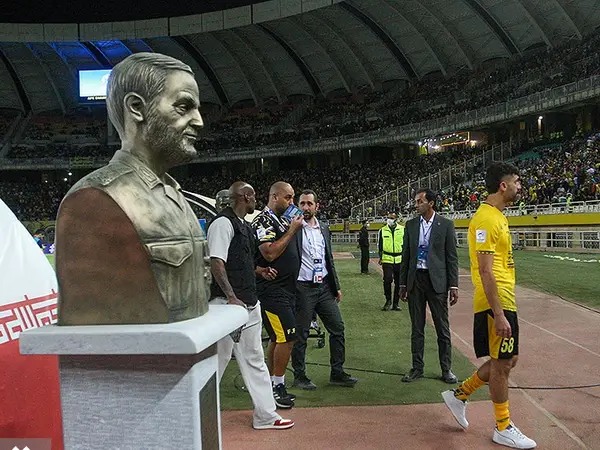The Iranian regime has launched a campaign against Saudi Arabia after a Saudi football team refused to play while a bust of IRGC's Qassem Soleimani was on display.
The furor broke out on Monday evening when Al-Ittihad was due to play Iran's Sepahan at Esfahan's Naghsh-e-Jahan Stadium.
The Saudi team's players refused to leave their dressing-room in the standoff against Iran's move to place a bust of Soleimani in the stadium. The IRGC Quds Force general was behind the brutal Houthi militia attacks on Saudis during the years-long war, before he was killed in a US airstrike in Baghdad in 2020. Instead of playing, the team went directly to the airport and left for Saudi Arabia.
The Iranian club has announced plans to file a lawsuit against the Saudi team at the Asian Football Confederation (AFC) while Al-Ittihad blames the hosts for the cancellation of the match. A Saudi sport TV show cited an unnamed source from the club as saying that the Iranians were asked to remove the bust prior to the match.
Alireza Marzban, a former coach of Sepahan, told Iran International that following the request by the AFC to remove the statue, officials sought permission from the Office of the Supreme Leader, which did not grant permission for the removal of Soleimani’s bust. He said, "Sepahan FC tried to remove Soleimani's bust from the stadium through Esfahan’s Friday prayer Imam – Ali Khamenei's representative in the city -- and the governor, and they even contacted the Supreme Leader's office. However, all of the bodies opposed the request.”
Hours after the cancelled encounter, the municipality of the capital Tehran started installing numerous banners of Soleimani -- revered as a hero by regime hardliners -- across the city. The posters of the slain commander of the IRGC-Quds force -- designated as a terrorist group by several countries – bear the caption that reads: “They are afraid of his eyes.”
Soleimani was responsible for the actions of Iran's proxies across the region, and scores of terror attacks leading to the deaths of civilians and attacks on US targets in the Middle East.
Saudi Arabia designated Soleimani and other IRGC commanders as terrorists in 2018. The Saudis accused Soleimani and the Iranian military of attacks on Persian Gulf shipping and oil installations.
Revolutionary Guard-affiliated Fars news said the city is “adorned” with photos of the commander in response to the Saudi team's refusal to play. The IRGC Quds force is designated a terror group by several countries including the US, but to regime fanatics.
Regime propagandist Ali-Akbar Raefipour said on X (formerly twitter) that the move by Al-Ittihad players were “deliberate and pre-planned,” claiming that the symbolic move was related to the death anniversary of Saudi journalist Jamal Khashoggi. Khashoggi was allegedly murdered and dismembered inside the Saudi Arabian consulate in Istanbul in October 2018.
The drama has rocked the newly restored diplomatic ties between the two nations, which were reinstated only this year after years of standoff. In June, visiting Saudi Foreign Minister Prince Faisal bin Farhan also walked out of the room at Iran’s foreign ministry building – where a news conference was being held -- in protest to a picture of the IRGC general, the architect of proxy wars in the Middle East, including arming Yemen’s Houthis against Saudi Arabia.
Prince Faisal immediately requested the venue of the press conference to be changed and the Iranian side complied in a bid not to tarnish the newly revived relations between the two countries after years of tension which isolated the Iranian regime in the region.
The match between Al-Ittihad and Sepahan was mired in controversy even before it was called off. Videos surfaced Monday showing a large number of women denied entry to the stadium, with a police commander telling them that “women were not supposed to be let in to watch the match.” The police commander explicitly said that they had planned to allow only a cherrypicked group of women just to meet the regulations of Asian and global football authorities who have threatened to disqualify Iran if it does not allow women in the stadiums.
Among the controversies surrounding the match is how Iranian spectators reacted to the Saudi club’s symbolic move against the IRGC commander. People slammed the Iranian regime for making every aspect of life a subject of political propaganda, chanting “We do not want political football.” However, the most dominant slogans were in praise of Iran’s monarch Reza Shah, the first king of the Pahlavi dynasty. As people were leaving the stadium, they were chanting other slogans in support of monarchy in Iran. The disappointed spectators also threw garbage at the bust of Soleimani who has been idolized by the regime with streets and stadiums named after him.
Ordinary Iranians have set fire to or destroyed his statues and banners as an icon of the Islamic autocracy. In one such incident last year, Soleimani’s statue was torched hours after it was installed. On the third death anniversary of his death, people in several cities, including Tehran, Karaj, Zarinshahr, Rafsanjan, and his hometown Kerman, burned his statues and posters. Despite the Islamic Republic’s propaganda to portray Soleimani as a national hero, many people believe he was guilty of spreading violence in the region and repression at home.
